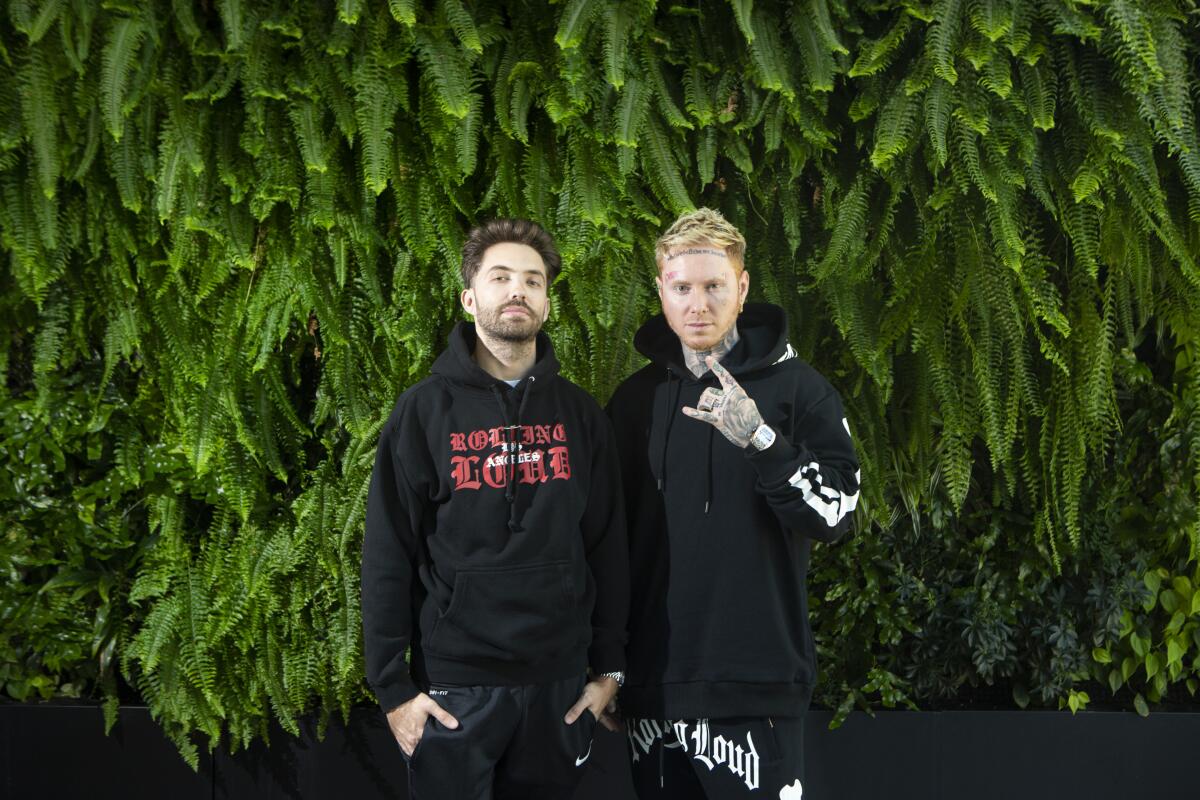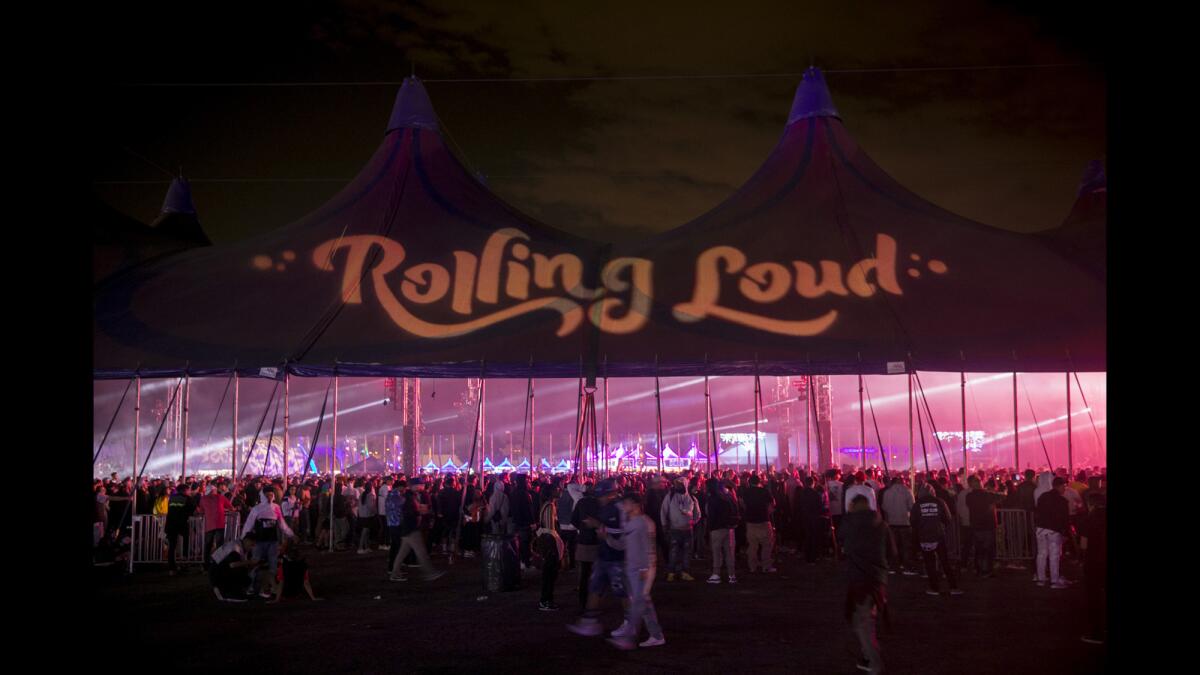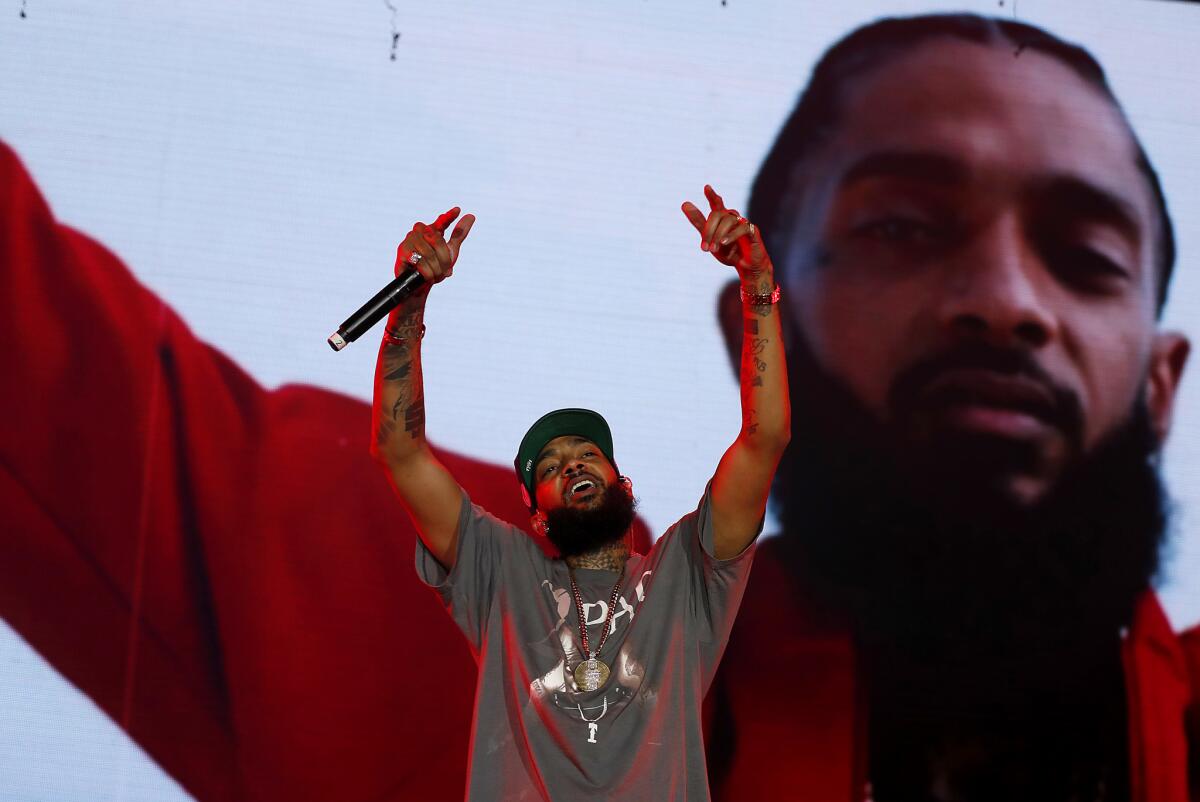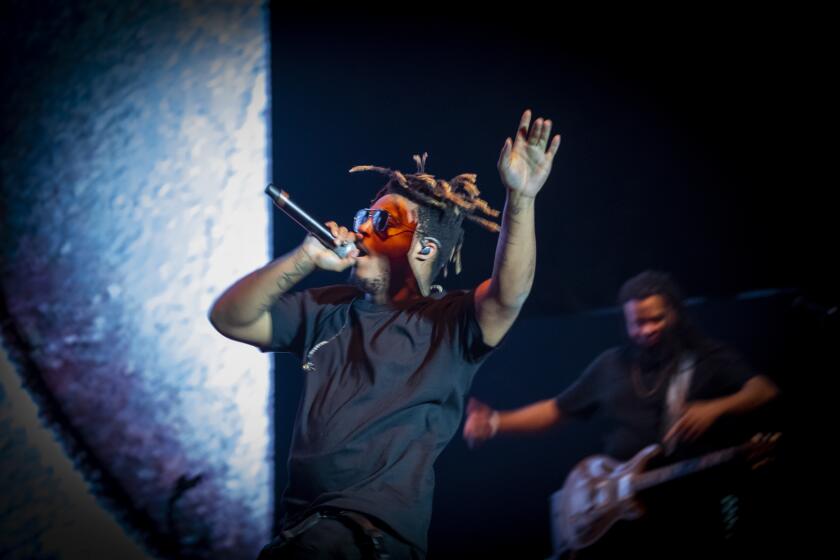Rolling Loud organizers plan Juice Wrld tribute: ‘It’s important to the fans’

A week before the hip-hop festival Rolling Loud returned for its third year in Los Angeles, co-founder Tariq Cherif was at home in Miami, idly thumbing through Instagram, when he saw the news that Juice Wrld, one of the fest’s headliners, was dead at 21.
“I saw a TMZ screenshot and I was like ‘No way.’ I clicked around the internet a little bit and found out it was real,” the 30-year-old Cherif said backstage at the Banc of California Stadium on Wednesday before this weekend’s sold-out festival, where 60,000 fans are expected to attend each of two days. “I tried to call some people close to him but couldn’t get through.”
“It was very shocking, I was caught off guard,” added Rolling Loud’s co-founder, 31-year-old Matt Zingler. “It seemed like everything was going well in his career, but I wasn’t aware of his personal life. It’s a huge loss.”
At November’s Camp Flog Gnaw, Juice Wrld paid tribute to fallen rappers XXXTentacion, Nipsey Hussle, Lil Peep and Mac Miller. On Sunday, he died at age 21.
Rolling Loud, the 5-year-old Miami-based festival, came of age in the SoundCloud rap era, where acts like Lil Peep, XXXTentacion and Juice Wrld upended hip-hop with fatalistic lyrics about drugs and depression and a compelling blend of emo and trap. All three of those acts died by age 21. Veteran acts Nipsey Hussle and Mac Miller were not much older when they died as well.
Now the marquee event of the dominant music culture in America, and one of the most promising new concepts in the global festival circuit, has to reckon with those losses. By its founders’ count, drugs and gun violence have claimed at least five artists who have performed at the festival. This weekend’s show will go on with Chance the Rapper, Future and ASAP Rocky atop a huge bill of underground sensations.
All outlaw music scenes have elements of danger and self-destruction, and the addiction crisis touches all corners of American life. But even Rolling Loud’s founders acknowledge that when headliners are dying just days before showtime, something in the industry has to change.
“We’ve never had it happen this close to the show before,” Cherif said, looking to the floor of his black-and-gold executive suite, worn down by the déjà vu of it all. “Usually the scene has some time to recover.”
Cherif and Zingler knew Juice Wrld professionally — they manage Florida rapper Ski Mask the Slump God, a close friend of Juice Wrld’s, and booked Juice Wrld to perform at last year’s fest in L.A.
“He was a super cool dude,” Cherif said. “He had these four-wheelers at his house and paintball guns and would invite people over and just have fun. Every show, he always killed his performance.”
While they’re trying hard not to turn this year’s Rolling Loud into a somber wake, there’s a grim irony in the fact that this wasn’t even the only artist memorial they had planned this year. They’d already planned a tribute to Hussle, the South L.A. rapper and activist whose murder shocked the hip-hop industry. Last year, they put up a mural wall dedicated to the late XXXTentacion, the troubled 20-year-old who topped charts and died in a hail of gunfire in a Miami robbery.
Rather than replace Juice Wrld, the organizers decided to keep his set time open, and to have a number of acts perform his songs in his absence. (As of Wednesday, the plan was just coming together and they didn’t know who would perform yet. Another headliner, Meek Mill, was also reported to have canceled his set).
“It’s something that we’re familiar with, putting together these tribute sets,” Cherif said. “It’s important for the families of the artists to keep the legacy going, and it’s important for the fans to give them a time to get their feelings out about it.”
Artists like Juice Wrld and Lil Peep, who performed at Rolling Loud in 2017, had their lives ravaged by drugs (Juice Wrld’s death is under investigation, but his entourage was caught with a significant stash of drugs and guns). Those habits aren’t any more or less endemic than heroin was in ’90s grunge or cocaine was in ’70s disco. But Rolling Loud’s founders have an intimate awareness of the troubles in their scene.
Cherif, a father of two, has habits best described as “Cali sober” — weed with occasional drinking. But Zingler admitted he’s struggled with heavy drug addiction over the years, and was only able to grow Rolling Loud after getting sober and separating from the live-fast-die-young life of the Miami underground. Face-tatted, dressed in boutique streetwear, Zingler hasn’t had so much as a cigarette in six years.
As his scene faces a crisis of addiction and violence, Zingler says he’s feeling more of a responsibility to speak out about his own path to recovery.

“I don’t think it’s our place to tell anybody what to do, but I probably will go on our YouTube channel and talk about what I faced as a drug user because it’s not as easy as just saying ‘stop.’”
“These kids have so much pressure, there’s so much negativity thrown at them online and sometimes they go off for the release,” Cherif said. But he’s quick to point out that famous young creatives have always done the same. “I think that’s always been there. Ozzy Osbourne, the Sex Pistols, Marilyn Manson ... rock stars did not live a healthy lifestyle.”
Drugs aren’t the only challenge Rolling Loud faces as it enters the middle period of its ascent in the festival business. This year’s New York debut hit a speed bump when police demanded that five rising local rappers be removed from the bill because they were “affiliated with recent acts of violence.” A shooting on a Miami freeway outside the festival grounds last year, aimed at Young Thug’s bus, shook up artists. The rapper Kodak Black was arrested on gun charges minutes before he was scheduled to take the stage.
Gun violence is obviously not foreign in hip-hop. But Rolling Loud’s founders see it as emblematic of America’s bigger conflicts over gun control and violence, especially in their hometown.
“They call it the Gun-shine State,” Zingler said, riffing on Florida’s nickname. He cited shootings at other live events like the Las Vegas massacre at the Route 91 Harvest country music festival. “I do not think that Rolling Loud by any means is the reason why there will be shootings. Florida has a lot of issues with gun control and gun violence and open carry.”
“It’s some type of prejudice to say that because a hip-hop show is in town that all of these artists brought violence into town,” Cherif added.

The L.A. shows have, so far, avoided any similar incidents, and the fest will abide by its city-approved security plans. Rolling Loud now throws shows in Miami (this year’s fest was at the 65,000-capacity Hard Rock Stadium), L.A., the Bay Area and New York, with an eye on expanding to Japan, China and Europe in the coming years. While they’ve partnered with L.A.-based EDM promoter Insomniac (which is allied with Live Nation) on shows outside of Miami, they’re still an independent promoter.
Obviously, the major event firms want in on the established and, all things considered, fairly smooth-sailing festival culture they’ve created. Other hip-hop events like Tyler, the Creator’s Camp Flog Gnaw have a super-dedicated fan base, but the idiosyncrasies of that scene make it harder to scale. “Drake, you’ve got a standing invitation to play at Rolling Loud, I promise it won’t happen here,” said Cherif with a laugh, alluding to the famed rapper’s frosty reception at his surprise Flog Gnaw set this year.
Zingler and Cherif said they’ve had ample opportunities to sell equity in Rolling Loud, but for now they’re sticking to their instincts in hopes the scene will continue its conquest of American music life.
“It’s something we’ve considered, but it has to be the right partner,” Cherif said.
As the two surveyed the still-being-assembled festival grounds outside the stadium in Expo Park on Wednesday, they said they have a much more basic responsibility to the scene they helped create. They have to prove to its talented, anxious young kids that a better world is possible, and worth living for.
“We should be assisting artists and saying, ‘What do you dream of doing?’” Cherif said. “That to me is more powerful than somebody telling me, ‘Hey, don’t do coke’.”
More to Read
The biggest entertainment stories
Get our big stories about Hollywood, film, television, music, arts, culture and more right in your inbox as soon as they publish.
You may occasionally receive promotional content from the Los Angeles Times.












